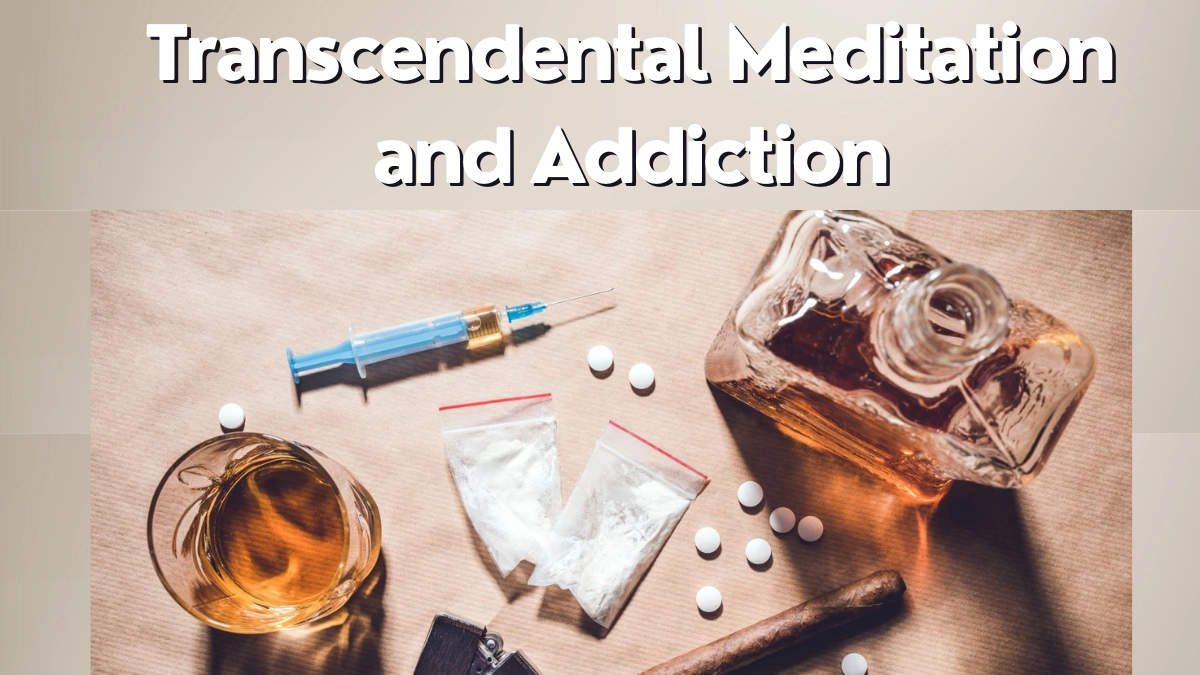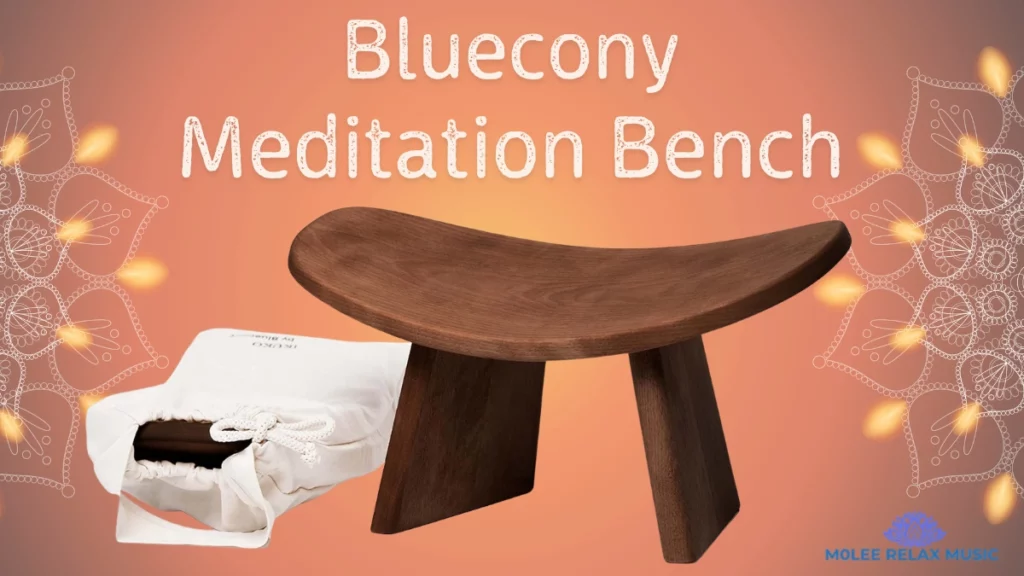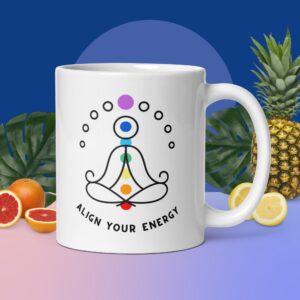|
Getting your Trinity Audio player ready…
|
In the hustle of our daily lives, battling addiction is a common struggle.
What if there was a gentle yet powerful approach to break free? Enter Transcendental Meditation, offering a unique perspective on conquering addiction.
This article is your guide to understanding the connection between Transcendental Meditation and Addiction. We’ll explore various addictive patterns, navigating the liberating journey that meditation unveils.
If you’ve ever felt the need to overcome addiction and reclaim control, read on to discover how Transcendental Meditation holds amazing potential, making the path to recovery clearer and more attainable.
What is Addiction?

Addiction is a complicated problem that affects the brain. It’s like a disease, making people use substances (like drugs or alcohol) even when it causes them harm. When someone has a serious addiction, their whole focus becomes using these substances, taking over their life completely. They keep using it, even if it leads to problems in their personal, work, or social life.
Addiction is not just about the physical act of using; it’s also about how the brain gets caught up in this habit. Understanding addiction as a brain disease helps us see how difficult it is for people, and it opens the door to finding better ways to help them recover.
Addiction is a chronic dysfunction of the brain system that involves reward, motivation, and memory. It’s about how the body craves a substance or behavior, especially if it causes a compulsive or obsessive pursuit of a “reward” and a lack of concern over consequences.
Types of Addiction
- Alcohol Addiction: Despite being legal, alcohol is sometimes misused and can lead to addiction, known as alcoholism. People with this type of addiction may find it hard to control their drinking, leading to negative effects on their health and daily life.
- Drug Addiction: This includes street drugs like heroin or prescription opioids, where people can become addicted. Drug addiction often involves a compulsive need to seek and use substances, despite the harmful consequences on physical and mental health.
- Substance Abuse: This term covers the excessive use of alcohol or drugs, encompassing a broad range of substances. Substance abuse goes beyond addiction and can include any harmful use of substances that negatively impacts one’s life, health, or relationships.
Causes for Addictions

- Genetic Factors: Addiction can run in families, making it more likely for individuals with a family history of addiction to develop similar patterns. It is not solely determined by genes but can be influenced by genetic predispositions.
- Environmental Factors: Peer pressure, stress, and early exposure to drugs can contribute to the development of addiction. Environmental factors play a crucial role, as individuals may turn to substances as a way to cope with challenges in their surroundings.
Symptoms of Addictions
- Physical Dependence: This involves developing tolerance to a substance and experiencing withdrawal symptoms when not using it. Physical dependence indicates the body’s adaptation to the substance, leading to a need for increased amounts to achieve the same effect.
- Psychological Dependence: Using substances as a way to cope with personal problems and challenges. Psychological dependence is characterized by a strong emotional reliance on the substance for comfort or escape, often hindering the ability to deal with life without it.
Why do Women Try Drugs?
- Stress: Women may turn to drugs to manage stress related to their roles in the family or workplace. The pressures of balancing responsibilities may drive some to seek relief through substances.
- Emotional Issues: Substance use may be a way for women to self-medicate against feelings of depression and anxiety. Addressing emotional issues through drugs can provide a temporary escape but may exacerbate long-term mental health challenges.
Remembering to stay sober can be a daily challenge for individuals with a history of drug or alcohol problems, but with proper treatment and support, they can maintain their sobriety and avoid relapse.
Read our full article on Transcendental meditation effects on the human brain from here.
Recovery from Addiction
In addressing addiction, recovery goes beyond abstinence. It involves learning new ways to cope with life and fostering long-term wellness.
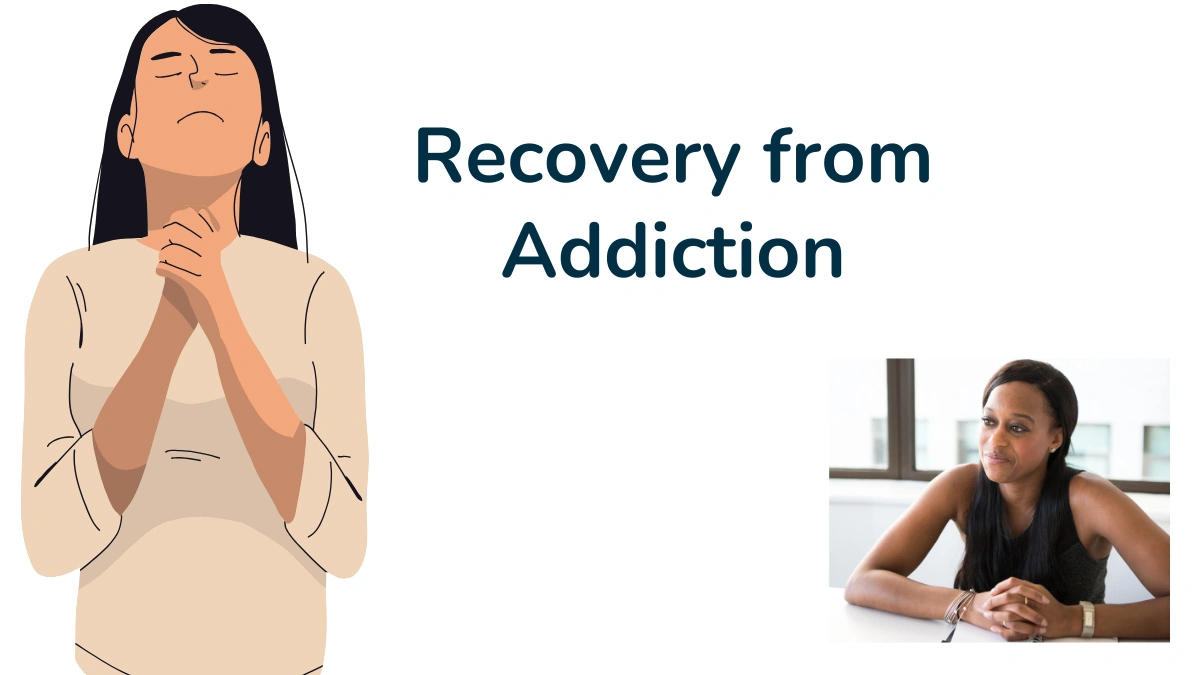
What is the main goal of recovery?
The main goal of recovery is to achieve and maintain abstinence from addictive substances. It also aims to enhance one’s ability to function, manage emotional stress, and improve quality of life. Recovery is an ongoing process that assists individuals in regaining control over their lives and health after the disruptive effects of addiction.
What do you learn in addiction treatment?
In addiction treatment, individuals learn coping strategies to handle cravings and regulate emotions. They are equipped with tools to rebuild relationships and develop healthy lifestyle habits. Therapy sessions often focus on identifying the triggers of substance use and developing strategies to avoid or manage them.
Road to recovery
The road to recovery often begins with detox, a phase where the body clears itself of drugs, potentially under medical supervision to manage withdrawal symptoms. This is followed by various forms of therapy that help to address psychological dependencies and provide support for behavioral change. Success often requires ongoing commitment and may involve support groups, where experiences are shared and mutual support is provided.
What are healthy alternatives to substance use and abuse?
Healthy alternatives to substance use include engaging in regular physical activity, practicing mindfulness or relaxation techniques like Transcendental Meditation, and pursuing hobbies or interests that provide fulfillment. These activities can help to regulate mood, reduce stress, and offer a sense of accomplishment without relying on substance use.
Transcendental Meditation
Transcendental Meditation (TM) is a form of silent mantra meditation developed by Maharishi Mahesh Yogi. It is simple to meditate for 20 minutes twice daily and is known for its stress-reducing benefits.
Transcendental Meditation is a technique that promotes a state of relaxed awareness. During TM, individuals silently repeat a mantra, which allows the mind to settle down and experience a profound state of rest.

Transcendental Meditation Benefits
The benefits of practicing TM are extensive and supported by research. Individuals often experience significant reductions in stress and anxiety, as well as improvements in mood and cognitive function.
How long does it take to see results from Transcendental Meditation?
Many practitioners report noticing positive effects immediately, although studies suggest more consistent and longer-term benefits develop over a few weeks to months of regular practice.
How is TM used to treat drug addiction?
TM has been implemented in various recovery programs because of its ability to help reduce cravings and stress, significant triggers for relapse. It empowers individuals to experience inner calm and increased clarity.
How long does it take to learn Transcendental Meditation?
The basic technique of TM can be learned in a few days, but it is typically taught in a course over four consecutive days, with a certified TM teacher, to ensure that the individual practices it correctly for maximum benefit.
Why Transcendental Meditation is not difficult to practice?
TM is considered effortless since it doesn’t involve concentration or contemplation, unlike other meditation practices. It requires no specific postures or breathing patterns, making it accessible to a wide range of individuals.
Research Findings Transcendental Meditation in Addiction Recovery
Transcendental Meditation (TM) has been explored as a therapeutic tool in addiction recovery. Scientific studies present supporting evidence that TM may be beneficial in reducing substance reliance and providing mental health benefits.
TM practice aims to bring about restful alertness, which can reduce stress—one of the key triggers for substance use. It is posited that by attenuating stress and promoting a state of relaxation, TM may enhance an individual’s ability to cope with cravings and withdrawal symptoms, thus supporting rehabilitation efforts.
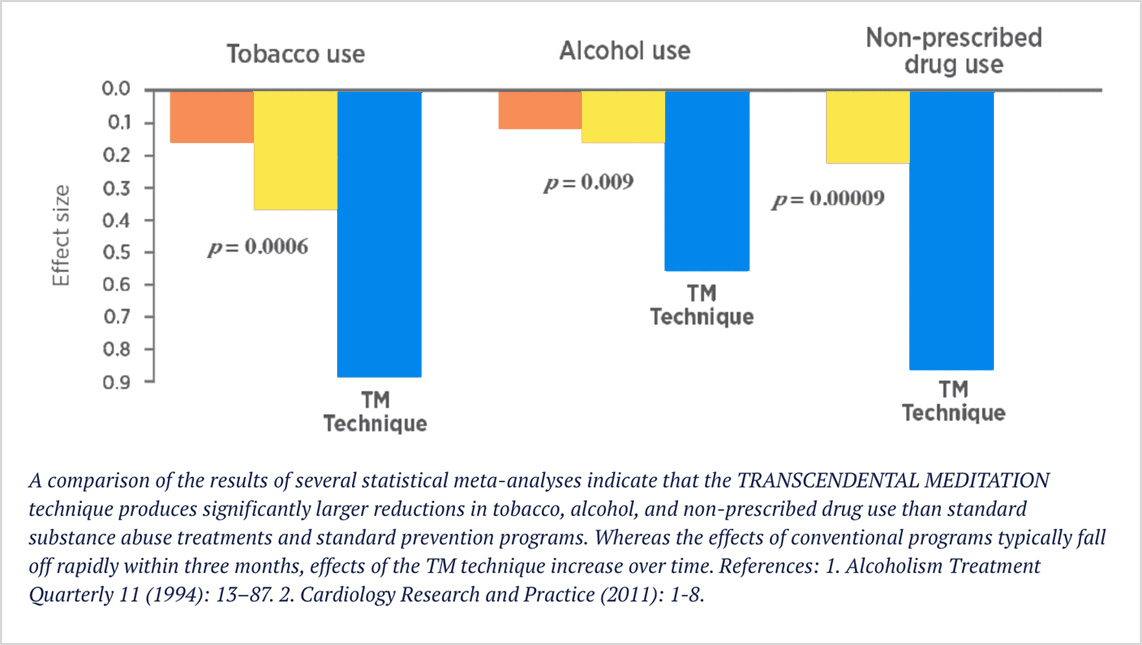
Real Testimonials

Personal accounts from individuals suggest that Transcendental Meditation (TM) has been an influential tool in their recovery from addiction, providing a sense of stability and inner peace.
Russell Brand
Russell Brand, an actor and author, credits TM with aiding in his recovery process. He has spoken openly about how the practice has provided him with a calming influence, countering the chaotic nature of addiction.
Tim Bennett
In his journey, Tim Bennett found TM to be pivotal. Addiction, TM, and Tim Bennett’s Story highlight how this meditation practice greatly reduced his impulses towards substance misuse, marking a significant turn in his life.
Dr. Deepak Chopra
Dr. Deepak Chopra, a renowned advocate for alternative medicine, often discusses the benefits of TM. He emphasizes its potential to aid in controlling the stress that can exacerbate addictive behaviors.
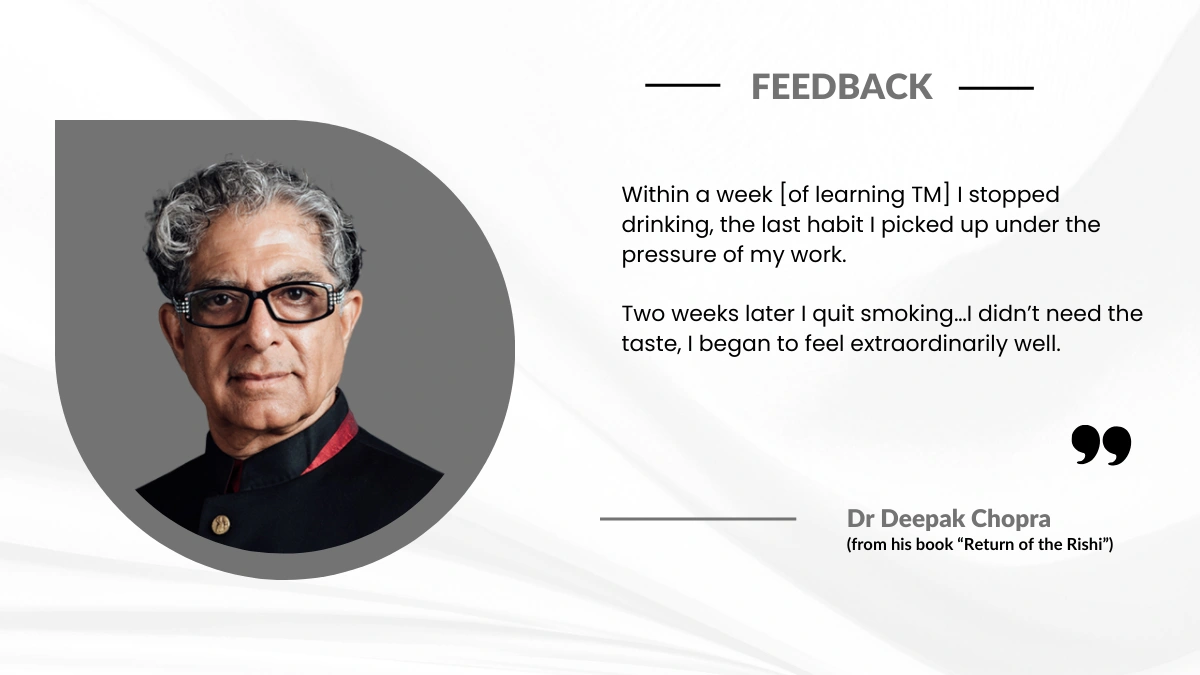
Bee Roberts
For Bee Roberts, Transcendental Meditation became a beacon of hope. She speaks to how TM helped fill the void substances once occupied, facilitating a healthier mental and emotional landscape.
“After my first weekend retreat as a new meditator, I gave up smoking and found the taste of alcohol distasteful…It created within me a heightened sense of awareness and a deep internal cleansing.”
Dana Knowles
Journalist Dana Knowles shares her narrative involving TM in her struggle with addiction. A Journalist’s Story of Addiction & Recovery recounts how TM became her main form of self-care and a cornerstone in her path to recovery.
Read our full article on transcendental meditation and alcohol from here.
Final Thoughts
In conclusion, we’ve learned that Transcendental Meditation can be a hopeful solution in the battle against addiction. By understanding different types of carvings, what causes them, and their signs, we’ve set the stage for a holistic approach to healing.
TM technique is not just a treatment. It’s like a positive change in how we see things and deal with life. This calming practice becomes a way for people struggling with addiction to find peace and a way out.
This journey with meditation opens up the possibility of a brighter future without drug abuse, where people can live free and happy lives. Let the calm and peace of meditation guide you toward a life without the troubles of dependency on substances, unlocking a better and happier path ahead.
FAQs on Transcendental Meditation and Addiction Recovery
How does recreational drug use impact addiction?
Recreational drug use can contribute to the development of addiction by altering brain chemistry and reinforcing compulsive behavior. Seeking professional guidance and exploring alternative practices, such as Transcendental Meditation, may aid in overcoming addictive patterns.
Can Transcendental Meditation be effective for those struggling with drug and alcohol issues?
Yes, Transcendental Meditation has shown promise in helping individuals struggling with drug and alcohol issues. It provides a tool for managing stress and promoting inner calm, supporting recovery efforts.
Can Transcendental Meditation help with addictive behavior?
Yes, studies suggest that Transcendental Meditation may have positive effects on addictive behavior. It can help individuals manage stress and develop a more balanced approach to life, reducing their reliance on substances.
How does Transcendental Meditation differ from other forms of meditation?
Transcendental Meditation is a unique form of meditation that involves the use of a specific mantra to achieve a deep state of relaxation. Its simplicity and emphasis on effortlessness distinguish it from other meditation techniques.
What is the goal of Transcendental Meditation?
The goal of Transcendental Meditation is to reach a state of transcendence or pure awareness. Practitioners aim to achieve deep relaxation and heightened clarity, promoting overall mental and physical well-being.
